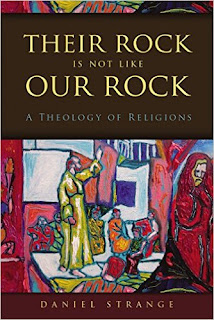AUTHOR: Daniel Strange
PUBLISHER: Grand Rapids, MI: Zondervan, 2014, (384 pages).
This is a theology of religions. More specifically, it is a theological perspective of all religions from the perspective of the Bible and the gospel of Jesus Christ. As the title of the book suggests, we need to be confident that the Word of God is solid footing from which to view the world. Even the title itself is unashamedly borrowed from Deuteronomy 32:31.
The author is basically arguing the following:
"From the presupposition of an epistemologically authoritative biblical revelation, non-Christian religions are sovereignly directed, variegated and dynamic, collective human idolatrous responses to divine revelation behind which stand deceiving demonic forces. Being antithetically against yet parasitically dependent upon the truth of the Christian worldview, non-Christian religions are ‘subversively fulfilled’ in the gospel of Jesus Christ."
Simply put, he believes that the interpretation of a universal religious experience can be seen in the light of the Christian faith. Using the blind man and the elephant example, which has often been used to showcase the need for pluralism, Strange argues that the truth as spoken by the elephant itself rather than by the people touching the elephant. In other words, what better way to let the God of all creation speak about other gods and other beliefs that exist in a world that God had first created. It is essentially the theology of the revelation of God. His method for doing so is based on the following presuppositions:
- Ontology precedes epistemology (eg, being comes before knowing)
- Creation is a reflection of God's thoughts
- The unique place of the Bible that transcends all others
- The revelation of God and Christ made flesh
- It is not the world interpreting God but God interpreting the world.
- The Reformed theological foundation is the chosen way.
1) Imaginal - an intuitive belief
2) Remnantal - a perceivable reality
3) Influential - a form of syncretism where Judeo-Christian worldview is mixed with others
4) Demonic - counterfeit of the Divine God
Gradually, Strange looks at the gospel on how it subverts the world and why it is the light of the world. He looks at the place of the Church and argues that it is a "subversive-fulfulment community" that is shaped by God, is called of God, and witnesses for God. In terms of application, Strange reserves a chapter on pastoral perspective that helps us deal with questions on the flourishing of pluralistic religions, that looks at why if God is the Truth, that He allows other religions to grow and to even become a threat to Jesus. This is an important concern which I am glad Strange addresses. In fact, this book is essentially about asserting the place of the gospel and Jesus Christ, that Jesus is most relevant, most needful, and True.
Strange is concerned about the way many people believe in "neutrality" perspectives in which the way to interpret anything must be something neutral and non-partial. The truth is, everyone is biased to some degree. Everyone explain things from a particular perspective. Everyone will attempt to sway opinions to their side. Eventually, it is not about interpretation but about conviction and how well one expresses that conviction. He urges us not to be confident to use Reformed worldview to see and analyze other beliefs. He is aware that in a pluralistic society, it is increasingly difficult to proclaim Jesus as the only way, only truth, and only life. Worse, Christians are seen as irrelevant in a hostile environment. In response, Strange is using this book as a push back against the "arrogance and intolerance of pluralism." He believes that it is possible to develop and implement a theology to make sense of all other religions. He wants to show that the gospel has the power to change lives and people. In as much as pluralism is trying to hem Christianity in, it is perfectly legitimate for Christianity to challenge such pluralistic arrogance. Influenced by Tim Keller and Don Carson, Strange goes on the "offensive" to let the authority of Scripture have the first and last say.
This is an academic treatise and contains rather difficult theological concepts to grasp at first glance. The central theme is that we need God who first created the Universe to help us understand the universe we live in. It is non-apologetic about using the Bible. It does not shy away from asking tough questions. It includes the author's frank admission of his own background and context. We need more scholars and practitioners like Strange who will let his faith show the way not only for himself but for others.
Daniel Strange is the Academic Vice Principal at Oakhill Theological College in London, and lectures on Culture, Religion, and Public Theology. Growing up in Guyana, he calls himself an "unashamedly confessional and evangelistically evangelical." His mother is a white Christian, his father "an agnostic and secular Hindu" while his grandmother is a devout Hindu.
Rating: 4.75 out of 5 stars
conrade
This book is provided to me courtesy of Zondervan Academic and NetGalley in exchange for an honest review. All opinions offered above are mine unless otherwise stated or implied.

No comments:
Post a Comment